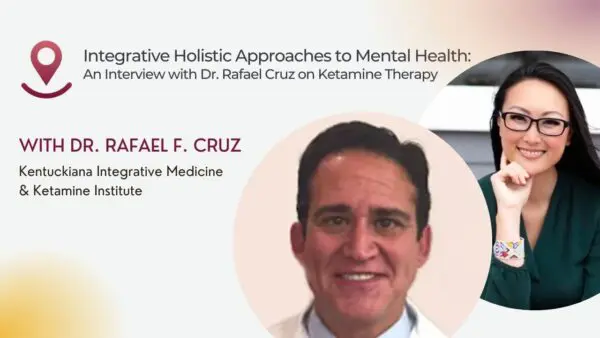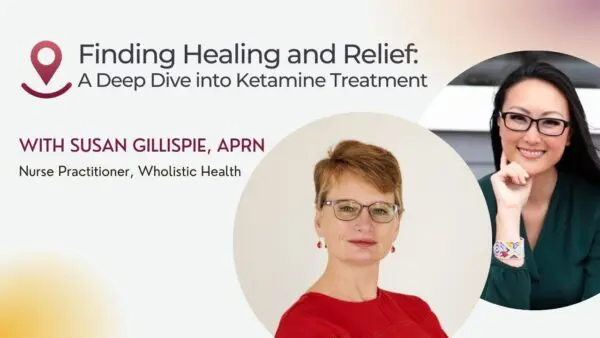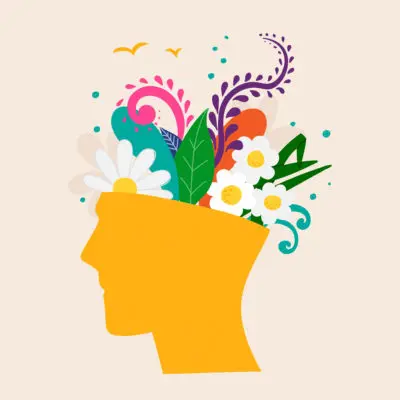Medical Editor: Dr. David Cox, PhD, ABPP
Suicidal ideation is a painful and possibly deadly side effect of conditions such as PTSD and depression. One’s life is interrupted by violent imagery, feelings of emptiness, and in more extreme cases, even detailed written suicide plans. However, despite the intensity of these experiences, suicidal ideation does necessarily not mean that one wants to die. More likely, it means that a person wants to live, but are in desperate need of compassionate and effective care. Our current treatment methods are not effective for everyone. However, mounting studies indicate ketamine’s effectiveness, in particular, through IV infusions, at treating suicidal thoughts — and fast.
What Is Ketamine?
Ketamine (along with cannabis, which is not always considered a classic psychedelic) is the only FDA-approved psychedelic, in the form of the nasal spray Spravato (esketamine), for treatment-resistant depression. While ketamine (what’s given as an infusion) is a mixture of two mirror-image molecules, “R” and “S” ketamine, the FDA-approved nasal spray, Spravato (esketamine) only contains the “S” molecule.
Before ketamine made a name for itself as a mental health treatment, it was hailed as reliable and generally safe anesthesia. In fact, while ketamine’s therapeutic potential combined with its psychoactive properties often have it lumped in with psychedelic medicines, it is a dissociative anesthetic first used on the battlefields of Vietnam. Ketamine was discovered in 1956 and approved in 1970 as an anesthetic agent derived from phencyclidine. Compared to opiates, ketamine is relatively safe as both an anesthetic agent and pain-reliever in hospital patients. It maintains hemodynamic stability, or stable blood flow, which is invaluable when treating physical trauma in a battlefield or emergency room setting.
Ketamine is listed on the World Health Organization Model List of Essential Medicines, which lists drugs considered to be the most effective and safe while meeting a health system’s most important needs.
Because ketamine sometimes elicits pleasurable side effects such as euphoria and relaxation, it is also a popular recreational drug. While it is regarded as a generally safe medicine, people seeking ketamine-assisted therapy should work closely with a qualified practitioner to avoid abuse or dependence.
What Is Suicidal Ideation?
Suicidal ideation consists of thinking about, or in more severe cases planning, suicide. It’s not a diagnosis itself but often is a symptom of depression and PTSD. Suicidal behavior is a leading cause of death and disability worldwide and is the 10th most common cause of death in the U.S. Furthermore, according to the CDC, even more people think about suicide. While there were more than 47,500 suicide deaths in 2019, 12 million American adults seriously thought about suicide, 3.5 million planned a suicide attempt, and 1.4 million attempted suicide.
Many of these people suffer from mental health conditions such as PTSD or depression. A 2015 study also suggests that the stigma surrounding mental illness may contribute to suicidal ideation. Compassionate care focused on reducing the stigma associated with mental health could may life easier for those with mental health issues.
To make matters more complicated, the current first line of treatment for depression, such as SSRI antidepressants, doesn’t work for everyone. According to a 2012 study, it is estimated that only 60-70% of people with depression experience results from traditional antidepressants such as SSRIs. That leaves a fair percentage of people still in need of help.
How Does Ketamine Treat Suicidal Ideation?
Given that suicidal thoughts are by definition life-threatening, imminent intervention and treatment are paramount. . SSRIs can take between two to six weeks to start working, with some patients not responding well to them. Unlike SSRIs, ketamine, in particular ketamine infusions, can be effective quickly. A 2017 study suggests that even a single dose of ketamine rapidly reduced suicidal thoughts within one day, and the reduction in suicidal ideation lasted for up to one week, in depressed patients with suicidal ideation. The ketamine dosage for depression is administered in subanesthetic doses, usually at 0.5 mg/kg (some patients may respond to doses as low as 0.1 mg/kg whilst others may need up to 0.75 mg/kg).
Another 2018 study, which focused on patients with clinically significant suicidal ideation in major depressive disorder, suggests that subanesthetic intravenous ketamine significantly reduced suicidal ideation for up to six weeks. While more science is needed to wholly grasp ketamine’s mechanism of action, evidence suggests that the psychedelic medicine works by way of pharmacological actions including inhibiting uptake of biogenic amines, inhibiting opioid receptor binding, and inhibition of N-methyl D-aspartate (NMDA) receptors.
One effective ketamine infusion protocol is to begin an initial round of six infusions given over a two-week period. The doctor or therapist will check-in with the patient three sessions in to see how it’s going. If the patient is improving, they complete the six-week course, usually feeling the benefits in hours to even days after a single infusion. Everyone is different but after the initial six sessions, patients come back for booster infusions as needed, perhaps once a month, or more or less frequently depending on the severity of the symptoms.
The esketamine nasal spray is the only FDA-approved ketamine treatment for mental health. It has been given the green-light as medicine for treatment-resistant depression. However, a 2019 study suggests that ketamine infusions may reduce suicidal ideation more effectively than the nasal spray, which only showed marginal effectiveness. Therefore, while treatment plans should be discussed with a doctor, off-label infusions may be the most beneficial method of ketamine administration for those with suicidal thoughts.
While many people experiencing suicidal ideation curate an on-going treatment plan with their doctor, ketamine also shows potential benefits for suicidal patients in emergency rooms in need of immediate attention. Another 2019 study suggests that ketamine can be a safe and effective means of rapid reduction in suicidal ideation in depressed, highly suicidal patients admitted to the emergency department.
Conclusion and Final Thoughts
Suicide rates in the U.S. have increased by 35% from 1999 to 2018, and have climbed dramatically during the recent covid-19 pandemic. It is alarmingly evident that suicide is a public health crisis, and intervention for those experiencing suicidal ideation is crucial. However, due to the limitations of traditional antidepressants such as SSRIs, there is a need for new solutions. The FDA-approval of the esketamine nasal spray was a landmark decision for psychedelic therapy; however, off-label infusions have demonstrated even greater efficacy in the management of suicidal ideation. As a society, the U.S. needs to work to destigmatize mental health treatment, in addition to further funding the research of novel and promising treatments such as ketamine infusions.







